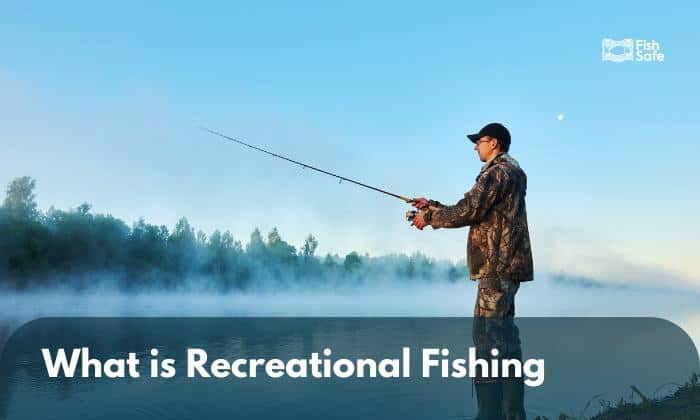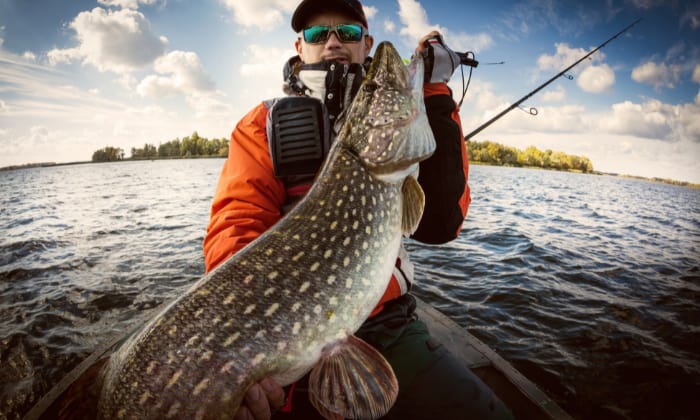Fishing is a popular hobby for millions of people around the world. In the US alone, approximately 55 million people enjoy recreational fishing.
Whether fly fishing or fresh and saltwater fishing, people from all walks of life escape their daily routine to cast a line or drop a hook, hoping to reel in that big catch.
Nonetheless, what is recreational fishing? In this post, you will find a straightforward answer, including relevant information to understand recreational fishing better.
Without further ado, let’s plunge into the tide of relaxation and fun!
Page Contents
Recreational Fishing: A Way to Reel in Relaxation
Are you intrigued by the tranquil act of casting a line into a serene lake, waiting for a tug, and reeling in a big catch?
Amidst the tranquility of nature, you might find yourself drawn by the sense of exhilaration that comes with the perfect blend of patience, skill, and joy. This is the world of recreational fishing!
As it sounds, recreational fishing, or leisure or sport fishing, refers to angling activities undertaken for pleasure or competition, not for commercial purposes.
Simply put, it’s angling for fun rather than the intention to accrue profit or survival benefits.
Most people practice this pursuit mainly for relaxation, enjoyment, and the potential excitement of reeling in fish. In most cases, the catch is often released back into the water or consumed as food. In other words, it isn’t sold or traded on export, domestic, or black markets.
A perfect example of recreational fishing is a family or group of friends going on a weekend fishing trip to a freshwater lake or pond. During the venture, they utilized tackles such as fishing rods, reels, lines, hooks, and bait. And, everyone enjoyed casting their lines and relaxing by the water.
The outing becomes an opportunity to catch fish and a valuable bonding time for everyone. Your primary purpose is to escape from the hustle and bustle of daily life and connect with nature while enjoying fishing outdoors.
Leisure fishing can be both done in freshwater and saltwater. The former usually occurs in lakes, rivers, and streams, while the latter happens along the coastline or deep seas. In the United States, saltwater recreational fishing ranges from Maine to Guam.
Recreational fishers aim for various species, depending on location, season, preference, and local regulations. Freshwater targets include trout, bass, and catfish, while saltwater species are flounder, drum, and striped bass.
Types of Recreational Fishing
There are several types of recreational fishing, each with its unique techniques, equipment, and allure. These are:
- Fly fishing: This method uses artificial flies cast with a specialized rod and line. It’s often applied in freshwater environments targeting salmon and trout.
- Spearfishing: Anglers dive into the ocean and use a spear( or speargun) to catch fish. This technique is popular in Hawaii and the Florida Keys.
- Trolling: Often employed in big-game fishing, trolling involves drawing a fishing line with baited hooks through water from a moving boat.
- Netting: Though not as common in recreational contexts, some anglers still practice netting. Cast nets or traps can be used, especially in “catch and release” situations.
- Conventional fishing/angling: It’s the most basic technique we are all familiar with. With this method, you have spinning rods and reels, baitcasters, and artificial or live lures.
Regulations Involving Recreational Fishing
State and federal laws both regulate recreational fishing. The authorities reiterate the importance of acquiring a license before participating in any fishing activity.
Moreover, these regulations also cover laws on fishing seasons and locations, size or bag limits, tackle restrictions, target species, and fishing methods. Fishing without a valid permit or outside of regulations can result in fines or other penalties.
Before heading out to your prospective honey hole, it’s critical to understand all relevant recreational fishing rules and regulations specific to the area. For more helpful information, visit the official state websites like the NOAA’s Fisheries Regulations page.
The Benefits of Recreational Fishing
This outdoor activity brings significant benefits to the angler and the economy. From an individual or well-being perspective, recreational fishing offers:
- Stress relief: Fishing for fun is often a relaxing activity, offering a way to disconnect from everyday stresses and enjoy nature’s serenity.
- Physical health: It might not seem like a workout, but this sport involves casting, reeling, and sometimes hiking to fishing spots. These can contribute to overall physical health.
- Mental health: The patience and focus required in fishing can be seen as a form of meditation, which can improve mental health and concentration.
- Social benefit: A fishing trip with friends or family can reinforce social ties and skills.
Some people may interchange recreational vs commercial fishing. However, these are two different forms of fishing. As discussed, the former is mainly for leisure, while the latter is fishing for profit and large-scale food production.
While commercial fishing tremendously drives economic growth, the merits of recreational fishing in our economy can’t also be overlooked. It creates revenues in the following ways:
- Direct economic impact: The sale of fishing equipment and supplies, fishing licenses, boats, and the operation of fishing lodges and guides all generate revenue.
- Job creation: The recreational fishing industry supports jobs in sectors such as retail, boat manufacturing, travel, and tourism.
- Revenues for the government: Sales of fishing licenses and taxes on particular fishing gear provide substantial income for local, state, and federal governments.
- Boost in tourism: Enthusiastic anglers travel for their hobby. Hence, they contribute to other local economies by spending on accommodation, food, and other services.
Conclusion
Recreational fishing is a thriving and cherished outdoor activity with a rich cultural significance and far-reaching benefits. As an engaging and rewarding pastime, it brings people closer to nature while also making a notable impact on the economy.
We hope this post has answered the question, “What is recreational fishing?” With a greater understanding and appreciation of recreational fishing, we can continue to treasure this timeless activity for future generations.

Fishing is an important part of my day-to-day life and a wonderful way for me to bond with friends and family. Whether you fish for recreation, competition, or exercise, I hope you find the guides here helpful. Don’t hesitate to drop me a message if you want further help.



